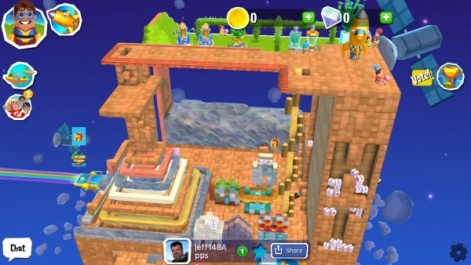“I love having a live game again,” says Markus Pasula.
The CEO of Finnish developer Grand Cru is speaking from bitter experience. Back in 2014, the company’s debut Supernauts was one of the most anticipated titles on the App Store.
Touted as ‘Minecraft meets LittleBigPlanet and Habbo Hotel‘, it was a beautiful universe builder with innovative controls, colourful characters and a deep free-to-play metagame.
Released after several years in development at a time when mobile gaming was condensing from high concept innovation into an avalanche of Clash of Clans and Candy Crush clones, the critics loved it but players didn’t get it. Supernauts’ servers were shut down at the end of 2015.
Self-published, this failure triggered a difficult period for Grand Cru, which spent the following years restructuring its staffing levels and processes for the future, as well as rebuilding confidence in its own creativity.

On that basis, the mid-2017 release of Battlejack, its card-based RPG published by Nexon, marked a turning point, perhaps even a reinvention.
So, with another game in development and an even more ambitious title in a prototype phase, it’s time for Grand Cru to look to the future.
Rebuilding
“Supernauts wasn’t successful but we learned a lot,” Pasula says of the experience.
Supernauts wasn’t successful but we learned a lot.Markus Pasula
“We focused on the processes of our development teams, especially making it cost effective.”
With a heritage of mobile game development stretching back to the days of Java as Real Networks’ internal studio Mr. Goodliving, the founders of Grand Cru had always produced incredibly polished games in terms of graphics and user experience.
With that foundation, the post-Supernauts months saw them get back to basics, splitting up into small teams to work on multiple prototypes. Indeed, Grand Cru’s next game, due sometime later in 2018, arose from this period.
“You need to focus on the core innovation and then get the game to a stage when you can start testing; test as early as possible,” Pasula explains.
Unsurprisingly, data is an important part of the development process at Grand Cru. Every milestone has some sort of minimum metrics bar that must be passed for the game to continue in development.
“Emotional decisions are often wrong,” Pasula states, citing how at one stage it took four games into alpha, only to discover later the test results for two of them were “really bad”.
“Before testing, we would not have known which games performed well and had we made decisions without the test, we probably would have made some bad ones,” he explains.
To some extent, games can always be improved, Battlejack being a case in point.
Since its August launch, Grand Cru and Nexon have continued to add new features with the game’s largest update yet - adding more social co-operative modes - due mid-January.
Getting better
On that basis, Pasula says Grand Cru now sees development as an ongoing and seamless process. “Launch isn’t a big event,” he notes.
Once the core experience has been successfully prototyped and tested, development through soft launch, full release and live operations becomes all about fulfilling players’ expectations. For Battlejack that now means long-term retention.
“You can’t rely on getting an audience for free any more, even if you do get app store featuring,” Pasula ponders.
There are still killer apps to be made.Markus Pasula
This means developers need to ensure the lifetime value (LTV) they can extract from their players is sufficiently higher than the cost of acquiring those users in the first place so that their business is profitable and can continue.
Of course, of all metrics LTV is notoriously difficult to calculate, especially during soft launch, so the good news is focusing on long-term retention will generally increase it. For example, since soft launch Battlejack’s LTV has increased five-fold, which is one reason Pasula remains confident about the future.
More generally, though, he remains convinced the mobile games market is open for developers like Grand Cru.
“There are still killer apps to be made,” he says.
“I think you can still make a top five top grossing game, but you need user acquisition and a game you can market successfully over time.”






















